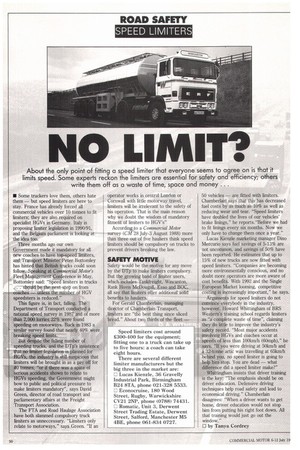NO LIMIT?
Page 52

If you've noticed an error in this article please click here to report it so we can fix it.
• Some truckers love them, others hate them — but speed limiters are here to stay. France has already forced all commercial vehicles over 10 tonnes to fit limiters; they are also required on specialist HGVs in Germany. Italy is proposing limiter legislation in 1990/91, and the Belgium parliament is looking at the idea too.
Three months ago our own Government made it mandatory for all new coaches to have top-speed limiters, and Transport Minister Peter Bottomley has hinted that British trucks could soon follow. Speaking at Commercial Motor's Fleet Management Conference in May, Bottomley said: "Speed limiters in trucks . . . should be the next step on from coaches — unless the number of HGV speedsters is reduced."
This figure is, in fact, falling. The Department of Transport conducted a national speed survey in 1987 and of more than 2,000 lorries 22% were found speeding on motorways. Back in 1983 a similar survey found that nearly 40% were breaking speed limits.
But despite the falling number of speeding trucks, and the DTp's insistence that no limiter legislation is planned for HGVs, the industry is still suspicious that limiters will be brought in as a pay off for 40 tonnes, "or if there was a spate of serious accidents shown to relate to HGVs speeding, the Government might bow to public and political pressure to make limiters mandatory", says David Green, director of road transport and parliamentary affairs at the Freight Transport Association.
The FTA and Road Haulage Association have both slammed compulsory truck limiters as unneccessary. "Limiters only relate to motorways," says Green. "If an operator works in central London or Cornwall with little motorway travel, limiters will be irrelevant to the safety of his operation. That is the main reason why we doubt the wisdom of mandatory fitment of limiters to HGV's"
According, to a Commercial Motor survey (CM 28 July-3 August 1988) more than three out of five hauliers think speed limiters should be compulsory on trucks to prevent drivers breaking the law.
SAFETY MOTIVE
Safety would be the motive for any move by the DIp to make limiters compulsory. But the growing band of limiter users, which includes Tankfreight, Wincanton, Rank Hovis McDougall, Esso and BOC, all say that limiters offer additional solid benefits to hauliers.
For Gerald Chamberlain, managing director of Chamberlain Transport, limiters are "the best thing since sliced bread." About two thirds of the fleet — 50 vehicles — are fitted with limiters. Chamberlain says that this has decreased fuel costs by as much as 10% as well as reducing wear and tear. "Speed limiters have doubled the Eves of our vehicles' brake linings," he reports. "Before we had to fit linings every six months. Now we only have to change them once a year."
Lucas Kienzie marketing manager Dino Mercurio says fuel savings of 5-13% are not uncommon, and savings of 50% have been reported. He estimates that up to 15% of new trucks are now fitted with speed limiters. "Companies are becoming more environmentally conscious, and no doubt more operators are more aware of cost benefits. With 1992 and the Single European Market looming, competitive costing is increasingly important," he says.
Arguments for speed limiters do not convince everybody in the industry, however. Howard Whittingham of BRS Western's training school regards limiters as ''a complete waste of time", claiming they do little to improve the industry's safety record. "Most major accidents involving HGVs and coaches occur at speeds of less than 1001un/h (60rnph)," he says. "If you were driving at 50km/h and a 32-tonne artic was travelling at 651cm/h behind you, no speed limiter is going to help him stop. You are dead — what difference did a speed limiter make?"
Whittingham insists that driver training is the key: "The emphasis should be on driver education. Defensive driving techniques help road safety and lead to economical driving." Chamberlain disagrees: "When a driver wants to get home, driver education would not stop him from putting his right foot down. All that training would just go out the window."
0 by Tanya Cordrey




















































































































